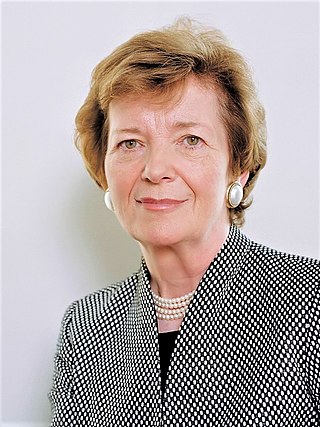Related Research Articles

Fine Gael is a liberal-conservative and Christian-democratic political party in Ireland. Fine Gael is currently the third-largest party in the Republic of Ireland in terms of members of Dáil Éireann and largest in terms of Irish members of the European Parliament. The party has a membership of 25,000 in 2021. Leo Varadkar succeeded Enda Kenny as party leader on 2 June 2017 and as Taoiseach on 14 June; Kenny had been leader since 2002, and Taoiseach since 2011.
Abortion in Ireland is regulated by the Health Act 2018. Abortion is permitted in Ireland during the first twelve weeks of pregnancy, and later in cases where the pregnant woman's life or health is at risk, or in the cases of a fatal foetal abnormality. Abortion services commenced on 1 January 2019, following its legalisation by the aforementioned Act, which became law on 20 December 2018. Previously, the 8th Constitutional Amendment had given the life of the unborn foetus the same value as that of its mother, but the 36th constitutional amendment, approved by referendum in May 2018, replaced this with a clause permitting the Oireachtas (parliament) to legislate for the termination of pregnancies.
The Eighth Amendment of the Constitution Act 1983 was an amendment to the Constitution of Ireland which inserted a subsection recognising the equal right to life of the pregnant woman and the unborn. Abortion had been subject to criminal penalty in Ireland since at least 1861; the amendment ensured that legislation or judicial interpretation would be restricted to allowing abortion in circumstances where the life of a pregnant woman was at risk. It was approved by referendum on 7 September 1983 and signed into law on 7 October 1983. In 2018, it was repealed by referendum.

Young Fine Gael (YFG) is the autonomous youth wing of Fine Gael, one of Ireland’s major centre-right political parties. It offers its members scope to assist in formulation of political policy, and the day-to-day running of the senior party. It is a founding member of the centre-right pan-European organisation, Youth of the European People's Party, also known as YEPP, which is the youth wing of the European People's Party.
Desmond A. Hanafin was an Irish Fianna Fáil politician who served for over 30 years as a member of Seanad Éireann. He opposed social liberalisation, particularly the legalisation of abortion, divorce and same-sex marriage, and was one of the founders of the anti-abortion advocacy group, Pro Life Campaign.

The Order of the Knights of Saint Columbanus is an Irish national Catholic fraternal organisation. Founded by Canon James K. O'Neill in Belfast, Ireland, in 1915, it was named in honour of the Irish saint, Columbanus. Initially established as a mutual benefit society for working class Catholics, it has developed into a fraternal benefit society dedicated to providing charitable services to all areas of the Irish community.
Plac may refer to:

Pro Life Campaign (PLC) is an Irish anti-abortion advocacy organisation. Its primary spokesperson is Cora Sherlock. It is a non-denominational organisation which promotes anti-abortion views, and opposes abortion in all circumstances, including cases of rape and incest.

Abortion-rights movements, also self-styled as pro-choice movements, advocate for the right to have legal access to induced abortion services including elective abortion. They seek to represent and support women who wish to terminate their pregnancy without fear of legal or social backlash. These movements are in direct opposition to anti-abortion movements.
Family & Life is an Irish anti abortion organisation founded in 1996.
Brendan Leahy is an Irish Roman Catholic prelate and theologian who has served as Bishop of Limerick since 2013.
The Abortion Rights Campaign (ARC) is an Irish abortion rights group. The group's goal is the introduction of free and legal abortion in Ireland and Northern Ireland. Prior to May 2018, the group campaigned for the repeal of the Eighth Amendment of the Irish Constitution, which was achieved with the passing of the Thirty-Sixth Amendment 2018. The ARC also campaigns for the Northern Ireland Assembly on behalf of abortion legislation and "to ensure the health of women in pregnancy is protected in line with international human rights standards".
The Citizens' Assembly is a citizens' assembly established in Ireland in 2016 to consider several political questions including the Constitution of Ireland. Questions considered include: abortion, fixed term parliaments, referendums, population ageing, and climate change. Over 18 months a report is produced on each topic. The government is required to respond officially to the reports in the Oireachtas (parliament); as of 9 April 2019 responses have been given on three of the five topics.
Cora Sherlock is a writer, blogger and campaigner in the Irish anti-abortion movement. She is deputy chairperson of the Pro Life Campaign. In 2014, she was included in BBC's 100 Women series.
Mellet v Ireland is a finding from the United Nations Human Rights Committee in 2016 that the Republic of Ireland's abortion laws violated human rights and the International Covenant on Civil and Political Rights by banning abortion in cases of fatal foetal abnormality and by forcing her to travel to the United Kingdom for an abortion.
Women Hurt is an Irish anti-abortion organisation for women who regret having an abortion. They campaign against change in the state's abortion law. They have appeared on TV debates about abortion, and participated in anti-abortion protests.

Together for Yes (TFY) is an abortion rights campaign group in Ireland. It campaigned successfully for a Yes vote in the 2018 referendum to ratify the Thirty-sixth Amendment, which removed the Eighth Amendment's constitutional ban on abortion in Ireland.

The Thirty-sixth Amendment of the Constitution of Ireland is an amendment to the Constitution of Ireland which permits the Oireachtas to legislate for abortion. The constitution had previously prohibited abortion unless there was a serious risk to the life of the mother.
Secularism in the Republic of Ireland has been described as a "Quiet Revolution", comparable to the Quiet Revolution in Quebec. It is an unofficial term that encompasses a number of significant social and political movements related to secularism and secularization, which have occurred within the last thirty years, and involved no violence or force. It has been described as a period where "the people led, and the politicians followed". Since the passing of a 1972 amendment with overwhelming public support, Ireland has had a secular constitution, although a high degree of religious influence over laws, education, and state business still persisted in the decades which followed, diminishing only in more recent times. In an assessment of the Irish state's overall secularity, Humanists International gave Ireland a mixed score, finding "systematic discrimination" against non-religious people in government, education, and society.

The Seanad Éireann career of Mary Robinson began on 11 June 1969 and ended on 5 July 1989. Mary Robinson was elected for a total of seven terms as a member of Seanad Éireann, always running in the Dublin University constituency. Upon leaving her seat in 1989, she did not seek re-election.
References
- ↑ O'Toole, Fintan (26 August 2014). "Why Ireland became the only country in the democratic world to have a constitutional ban on abortion". The Irish Times. Retrieved 4 May 2017.
- ↑ Nolan, Patrick (28 April 1981). "Move to keep abortion illegal". The Irish Times. pp. 1, 8.
- ↑ Hesketh, Tom (1990). The Second Partitioning of Ireland?: The Abortion Referendum of 1983. Brandsma Books. pp. 12. ISBN 9780951151648.
- ↑ "Referendum Results" (PDF). Department of the Environment, Community and Local Government . Archived from the original (PDF) on 24 December 2014. Retrieved 28 May 2015.
- ↑ Muldowney, Mary (2013). "Breaking the silence on abortion:the 1983 referendum campaign". History Ireland (published March–April 2013). Retrieved 12 April 2021.